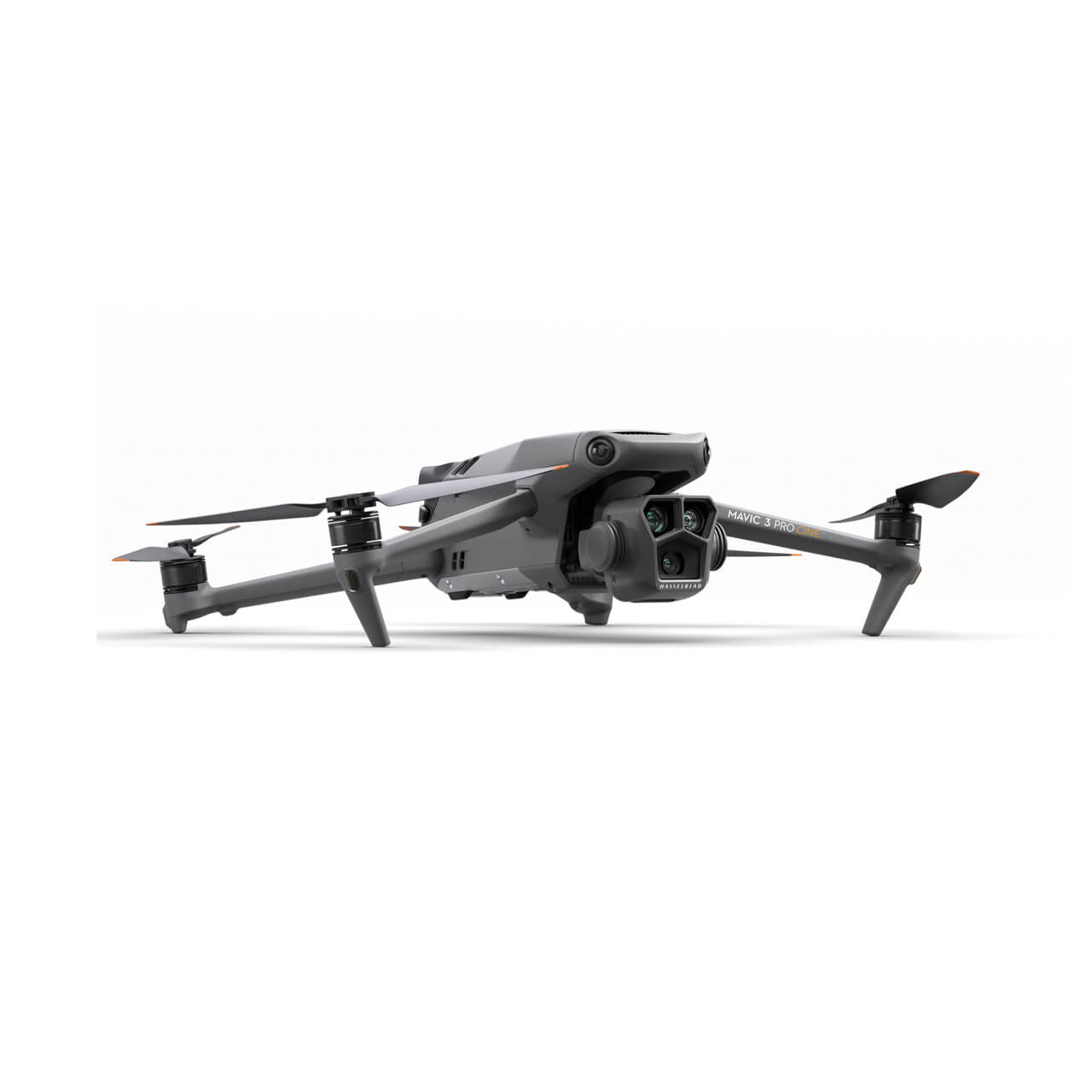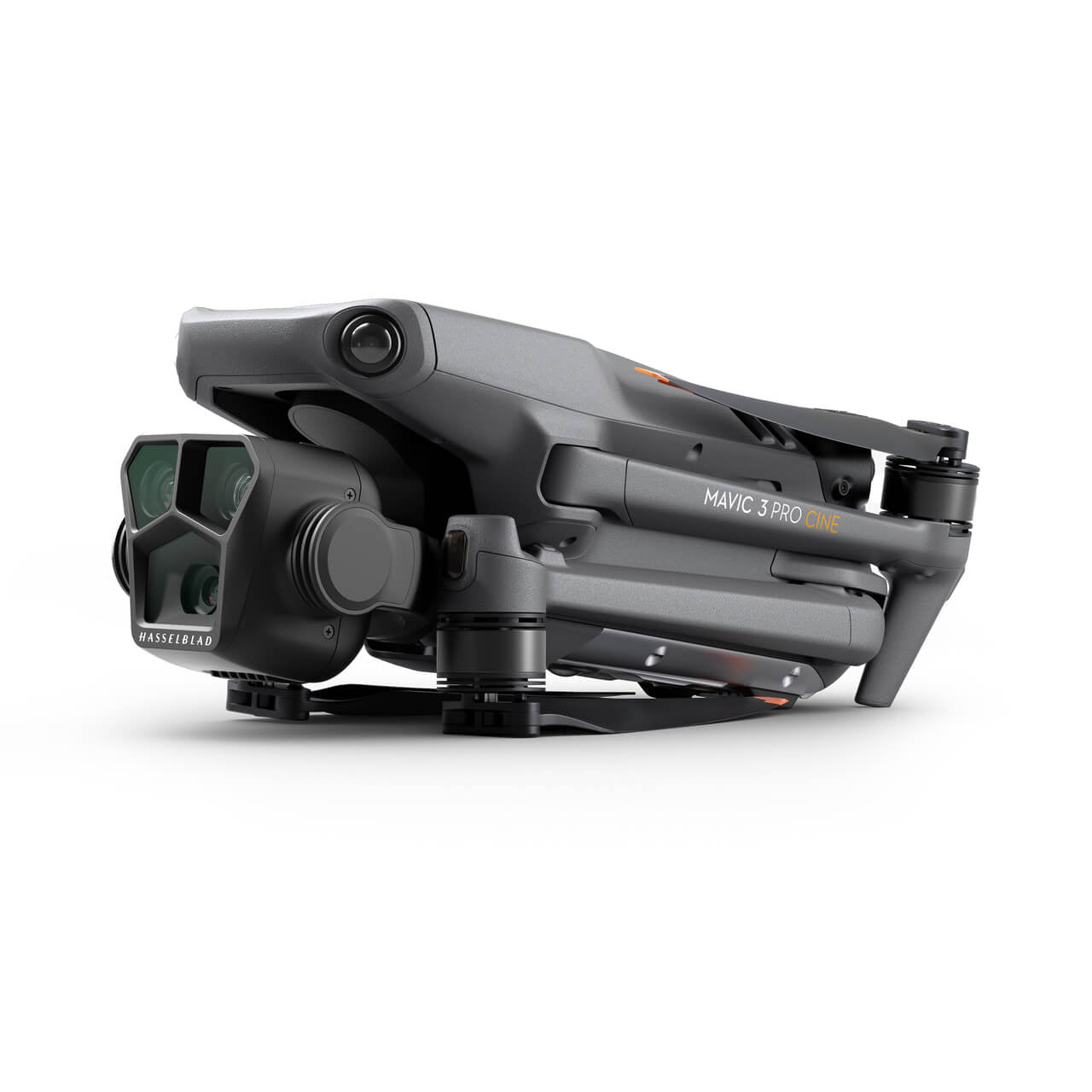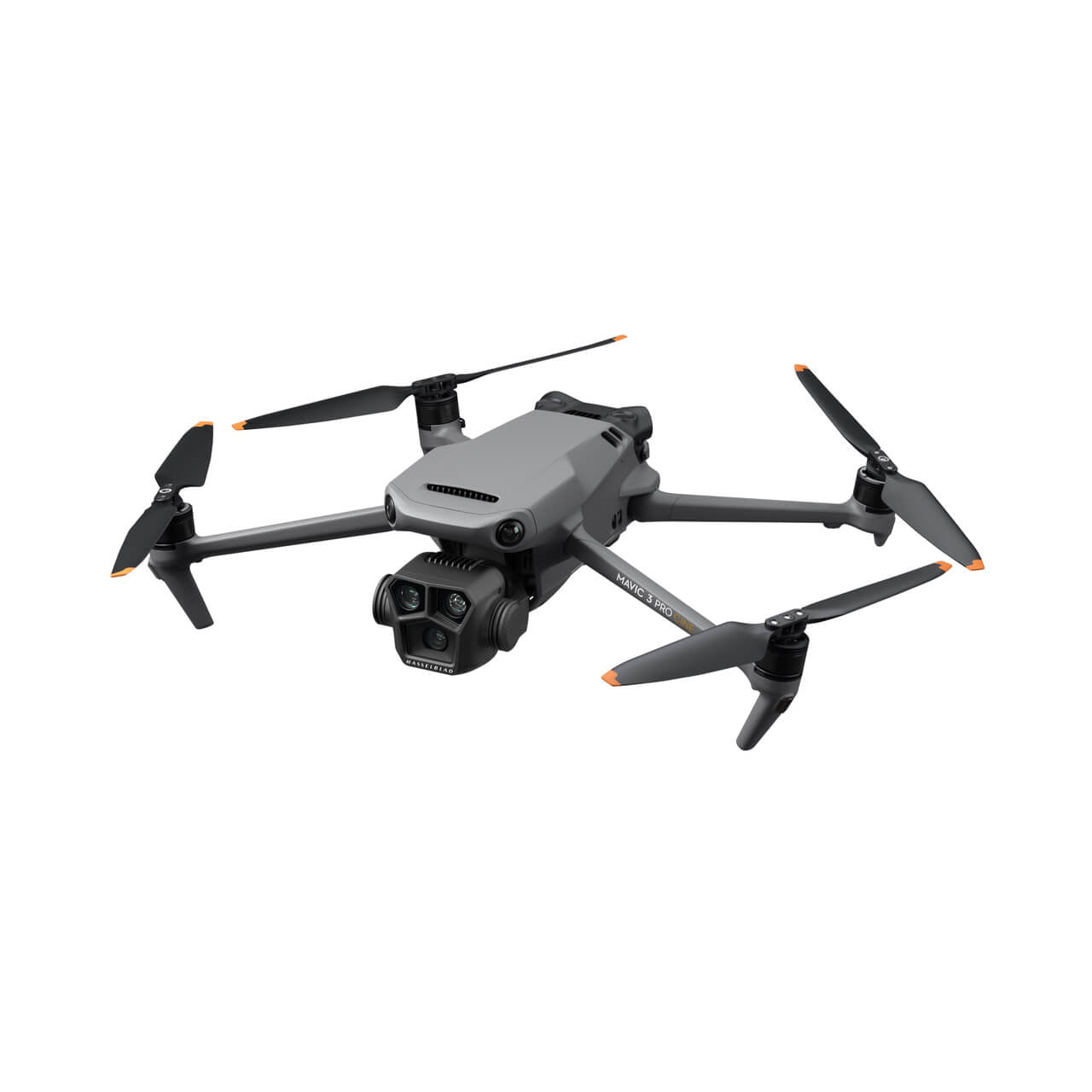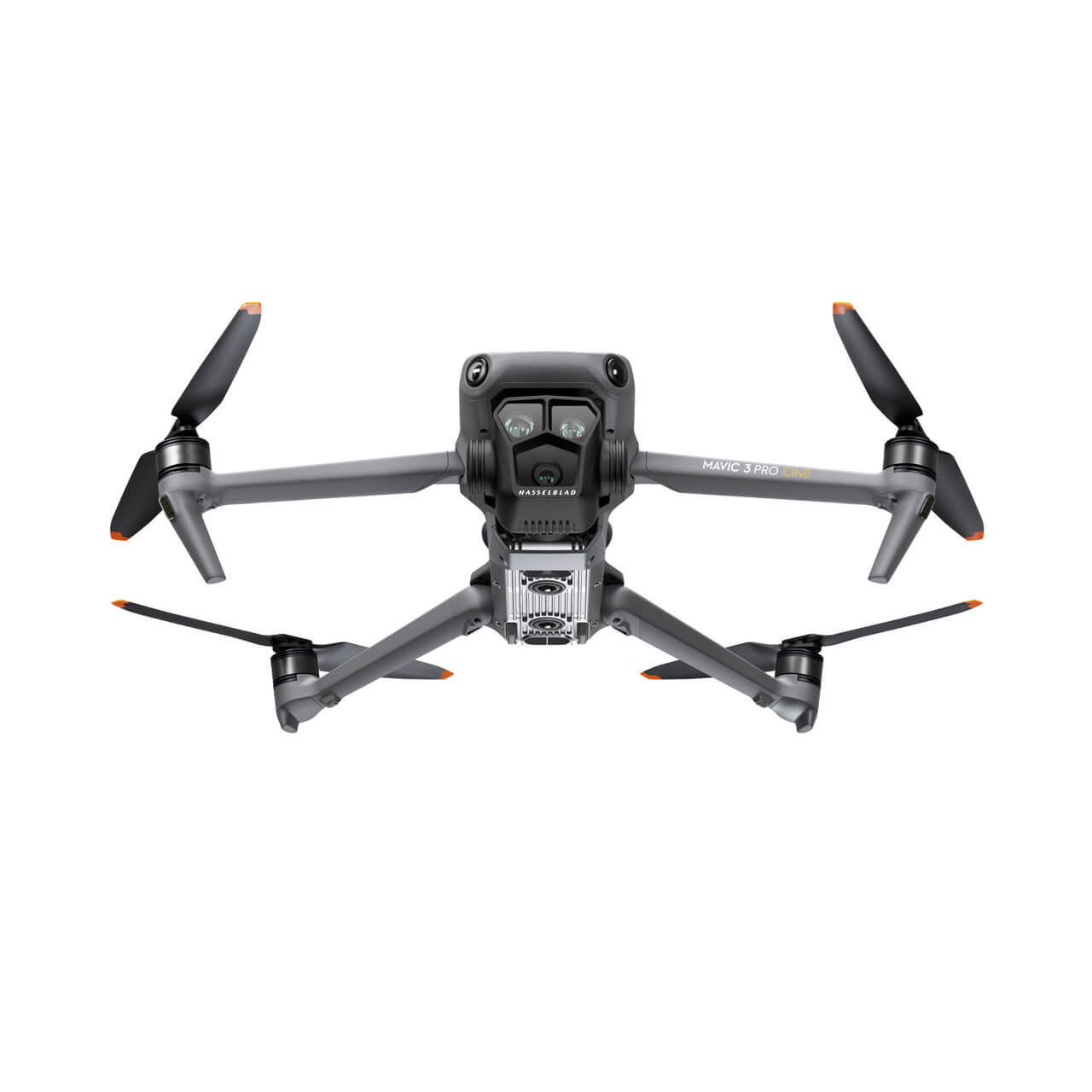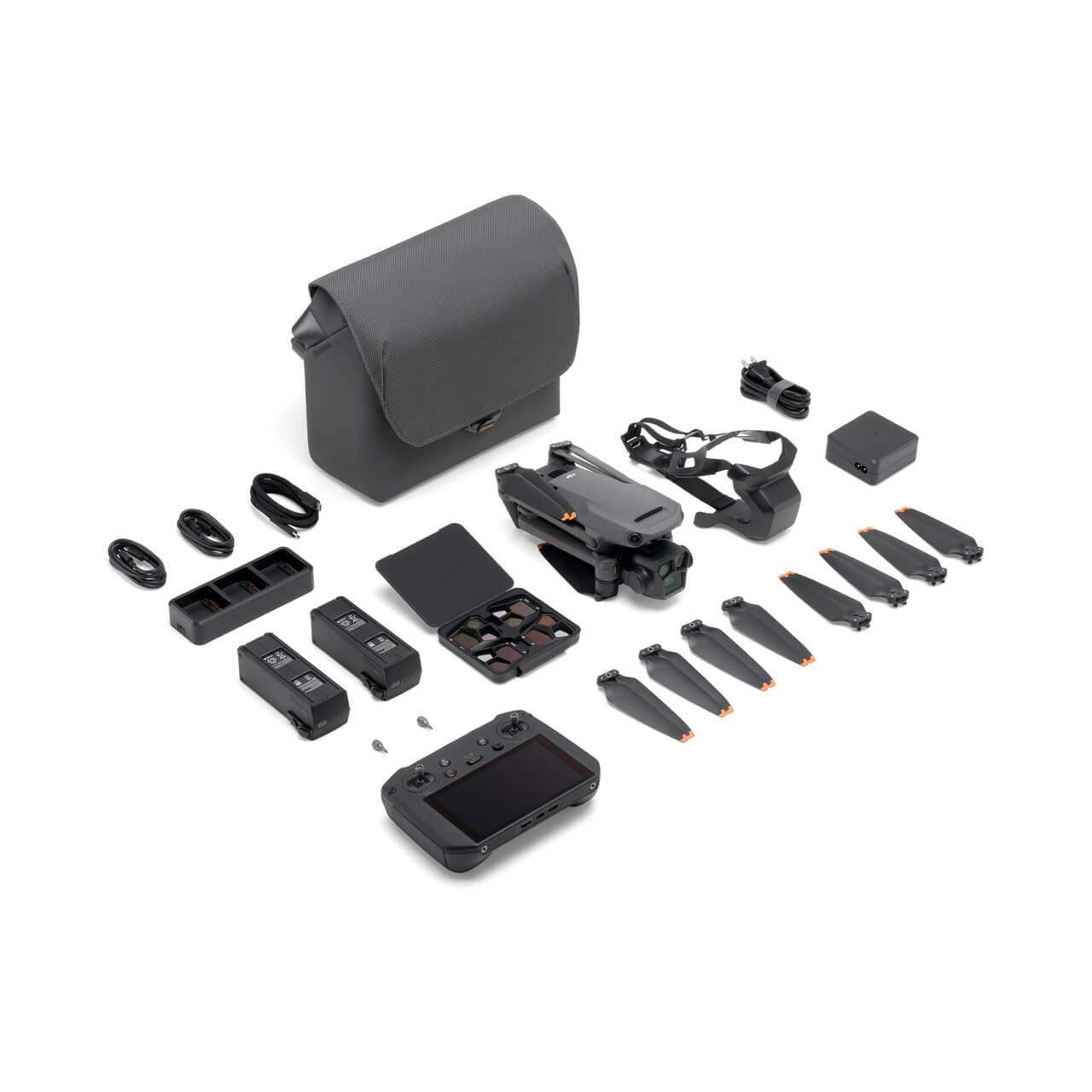DJI Mavic 3 Pro Cine Premium Combo (DJI RC Pro)
DJI Mavic 3 Pro Cine Premium Combo (DJI RC Pro)
Couldn't load pickup availability
OVERVIEW
The DJI Mavic 3 Series features next-level imaging performance. Mavic 3 Pro's triple-camera system ushers in a new era of camera drones by housing three sensors and lenses with different focal lengths. Equipped with a Hasselblad camera and dual tele cameras, Mavic 3 Pro is a triple-camera drone that unlocks new shooting perspectives, allowing you to embrace creative freedom further, capture fascinating scenery, explore photographic storytelling, and make cinematic masterpieces.
FEATURES
Flagship Tri-Camera System: With a 4/3 CMOS Hasselblad camera, a 70mm tele camera, and a 166mm tele camera, Mavic 3 Pro helps you create stunning works in various scenarios.
4/3 CMOS Hasselblad Camera: The Hasselblad camera shoots 5.1K/50fps and 4K/120fps [1]with a f/2.8 - f/11 range. The 10-bit D-Log M mode records up to one billion colors.
Apple ProRes for Pro Creation: Mavic 3 Pro Cine has triple camera Apple ProRes codec support. It also has a built-in 1TB SSD [2] and a 10Gbps lightspeed data cable.
43-Min Max Flight Time[3]: Mavic 3 Pro gives you more confidence to fly further while enjoying aerial photography creation. Execute every step during a single flight.
Omnidirectional Obstacle Sensing[4]: Mavic 3 Pro allows you to fly even in complex environments. Eight sensors and powerful computing engine sense obstacles and plan a safe route.
15km HD Video Transmission [5]: DJI O3+ supports a transmission distance of up to 15 km and 1080p/60fps live feed, for smoother control.
WHAT'S IN THE BOX:
|
|
TECHNICAL SPECIFICATIONS:
Aircraft +
| Takeoff Weight | Mavic 3 Pro: 958 g |
| Dimensions |
Folded (without propellers): 231.1×98×95.4 mm (L×W×H) Unfolded (without propellers): 347.5×290.8×107.7 mm (L×W×H) |
| Max Ascent Speed | 8m/s |
| Max Descent Speed | 6m/s |
| Max Horizontal Speed (at sea level, no wind) | 21m/s |
| Max Takeoff Altitude | 6000m |
| Max Flight Time |
43 Minutes Measured in a controlled test environment. Specific test conditions are as follows: flying at a constant speed of 32.4 kph in a windless environment at sea level, with APAS off, AirSense off, camera parameters set to 1080p/24fps, video mode off, and from 100% battery level until 0%. Results may vary depending on the environment, actual use, and firmware version. |
| Max Hovering Time |
43 Minutes Measured in a controlled test environment. Specific test conditions are as follows: hovering in a windless environment at sea level, with APAS off, AirSense off, camera parameters set to 1080p/24fps, video mode off, and from 100% battery level until 0%. Results may vary depending on the environment, actual use, and firmware version. |
| Max Flight Distance |
28 km The flight distance is different from the video transmission distance. The data was tested in a controlled environment, under the following specific test conditions: flying at a constant speed of 50.4 kph in a windless environment at sea level, with APAS off, AirSense off, camera parameters set to 1080p/24fps, video mode off, and from 100% battery level until 0%. Results may vary depending on the environment, actual use, and firmware version. |
| Max Wind Speed Resistance |
12m/s |
| Max Pitch Angle |
35º |
| Operating Temperature |
-10º to 40º (14º to 104º F) |
| Global Navigation Satellite System |
GPS + Galileo + BeiDou |
| Hovering Accuracy Range |
Vertical: ±0.1 m (with vision positioning) ±0.5 m (with satellite positioning) Horizontal: ±0.3 m (with vision positioning) ±0.5 m (with satellite positioning) |
| Internal Storage |
Mavic 3 Pro: 8 GB (approx. 7.9GB available space) Mavic 3 Pro Cine: 1 TB (approx. 934.8GB available space) |
| Class |
C2 (EU) |
Camera +
| Image Sensor |
Hasselblad Camera: 4/3 CMOS, Effective Pixels: 20 MP Medium Tele Camera: 1/1.3″ CMOS, Effective Pixels: 48 MP Tele Camera: 1/2″ CMOS, Effective Pixels: 12 MP |
| Lens |
Hasselblad Camera: FOV: 84° Medium Tele Camera: FOV: 35° Tele Camera: FOV: 15° |
| ISO Range |
Video Night: Photo |
| Shutter Speed |
Hasselblad Camera: 8-1/8000 s Medium Tele Camera: 2-1/8000 s Tele Camera: 2-1/8000 s |
| Max Image Size |
Hasselblad Camera: 5280×3956 Medium Tele Camera: 8064×6048 Tele Camera: 4000×3000 |
| Still Photography Modes |
Hasselblad Camera Medium Tele Camera Tele Camera |
| Photo Format |
JPEG/DNG (RAW) |
| Video Resolution |
Hasselblad Camera H.264/H.265 Medium Tele Camera H.264/H.265 Tele Camera H.264/H.265 |
| Video Format |
MP4/MOV (MPEG-4 AVC/H.264, HEVC/H.265) MOV (Apple ProRes 422 HQ/422/422 LT) |
| Max Video Bitrate |
Hasselblad Camera: Medium Tele Camera: Tele Camera: |
| Supported File System | exFAT |
| Color Mode and Sampling Method |
Hasselblad Camera Medium Tele Camera Tele Camera |
| Digital Zoom (only in Normal Video Mode and Explore Mode) |
Hasselblad Camera: 1-3x Medium Tele Camera: 3-7x Tele Camera: 7-28x |
Gimbal +
| Stabilization | 3-axis mechanical gimbal (tilt, roll, pan) |
| Mechanical Range |
Tilt: -140º to 50º Roll: -50º to 50º Pan: -23 to 23º |
| Controllable Range |
Tilt: -90º to 35º Pan: -5º to 5º |
| Max Control Speed (tilt) | 100º/s |
| Angular Vibration Range |
Hovering Without Wind: ±0.001° Normal Mode: ±0.003° Sport Mode: ±0.005° |
Sensing +
| Sensing Type | Omnidirectional binocular vision system, supplemented with an infrared sensor at the bottom of the aircraft. |
| Forward |
Measurement Range: 0.5-20 m Detection Range: 0.5-200 m Effective Sensing Speed: Flight Speed ≤ 15 m/s FOV: Horizontal 90°, Vertical 103° |
| Backward |
Measurement Range: 0.5-16 m Effective Sensing Speed: Flight Speed ≤ 12 m/s FOV: Horizontal 90°, Vertical 103° |
| Lateral |
Measurement Range: 0.5-25 m Effective Sensing Speed: Flight Speed ≤ 15 m/s FOV: Horizontal 90°, Vertical 85° |
| Upward |
Measurement Range: 0.2-10 m Effective Sensing Speed: Flight Speed ≤ 6 m/s FOV: Front and Back 100°, Left and Right 90° |
| Downward |
Measurement Range: 0.3-18 m Effective Sensing Speed: Flight Speed ≤ 6 m/s FOV: Front and Back 130°, Left and Right 160° |
| Operating Environment |
Forward, Backward, Left, Right, and Upward: surfaces with discernible patterns and adequate lighting (lux > 15) Downward: surfaces with discernible patterns, diffuse reflectivity > 20% (e.g. walls, trees, people), and adequate lighting (lux > 15) |
Video Transmission +
| Video Transmission System | O3+ |
| Live View Quality | Remote Controller: 1080p/30fps, 1080p/60fps |
| Operating Frequency |
2.400-2.4835 GHz 5.725-5.850 GHz |
| Transmitter Power (EIRP) |
2.4 GHz: 5.8 GHz: |
| Max Transmission Distance (unobstructed, free of interference) |
FCC: 15 km Measured in an unobstructed outdoor environment free of interference. The above data shows the farthest communication range for one-way, non-return flights under each standard. During your flight, please pay attention to RTH reminders in the DJI Fly app. |
| Max Transmission Distance (unobstructed, with interference) |
Strong Interference: Urban landscape, approx. 1.5-3 km Medium Interference: Suburban landscape, approx. 3-9 km Low Interference: Suburb/seaside, approx. 9-15 km Data tested under FCC standard in unobstructed environments with typical interference. Used for reference purposes only and provides no guarantee for actual transmission distance. |
| Max Transmission Distance (obstructed, with interference) |
Low Interference and Obstructed by Buildings: approx. 0-0.5 km Low Interference and Obstructed by Trees: approx. 0.5-3 km Data tested under FCC standard in environments with typical low interference. Used for reference purposes only and provides no guarantee for actual transmission distance. |
| Max Download Speed |
O3+: Wi-Fi 6: 80 MB/s* *Measured in a laboratory environment with little interference in countries/regions that support both 2.4 GHz and 5.8 GHz, with footage saved to the internal storage. Download speeds may vary depending on the actual conditions. |
| Lowest Latency |
130 ms (with DJI RC-N1 Remote Controller) Depending on the actual environment and mobile device. |
| Antenna | 4 antennas, 2T4R |
Battery +
| Capacity | 5000 mAh |
| Weight | 335.5g |
| Nominal Voltage | 15.4 V |
| Max Charging Voltage | 17.6 V |
| Type | Li-ion 4S |
| Energy | 77 Wh |
| Charging Temperature | 5º to 40º (41º to 104º F) |
| Charging Time |
Approx. 96 minutes Use the included data cable of the DJI 65W Portable Charger. Approx. 70 minutes Use the DJI 100W USB-C Power Adapter and DJI Mavic 3 Series 100W Battery Charging Hub. |
Charger +
| Input |
DJI 65W Portable Charger: DJI 100W USB-C Power Adapter: |
| Output |
DJI 65W Portable Charger: USB-A: DJI 100W USB-C Power Adapter: |
| Rated Power |
DJI 65W Portable Charger: 65 W DJI 100W USB-C Power Adapter: 100 W |
Battery Charging Hub +
| Input | USB-C: 5-20 V, max 5A |
| Output | Battery Port: 12-17.6 V, max 5 A |
| Rated Power |
Battery Charging Hub: 65 W Battery Charging Hub (100W): 100 W |
| Charging Type | Three batteries charged in sequence |
| Compatibility | DJI Mavic 3 Intelligent Flight Battery |
Storage +
| Recommended microSD Cards |
Lexar 1066x 64GB V30 A2 microSDXC
Lexar 1066x 128GB V30 A2 microSDXC Lexar 1066x 256GB V30 A2 microSDXC Lexar 1066x 512GB V30 A2 microSDXC SanDisk High Endurance 64GB V30 microSDXC SanDisk High Endurance 128GB V30 microSDXC SanDisk High Endurance 256GB V30 microSDXC Kingston Canvas Go! Plus 64GB V30 A2 microSDXC Kingston Canvas Go! Plus 128GB V30 A2 microSDXC Kingston Canvas Go! Plus 256GB V30 A2 microSDXC Kingston Canvas Go! Plus 512GB V30 A2 microSDXC |
Tech Spec Notes +
1. ActiveTrack is unavailable at video resolutions higher than 4K or frame rates over 60fps.
2. Actual available storage space may be reduced due to system configuration. For details, please refer to the Specs page of Mavic 3 Pro on the official DJI website.
3. Flight Time was measured with Mavic 3 Pro flying at a constant speed of 32.4 kph in a windless environment at sea level until the battery level reached 0%. Data is for reference only. Please pay attention to RTH reminders in the DJI Fly app during your flight.
4. DO NOT use the aircraft in severe weather conditions, including heavy wind exceeding 12 m/s, snow, rain, fog, hail, or lightning. DO NOT fly the aircraft 6000 m (19685 ft.) or higher above sea level. DO NOT fly the aircraft in environments where the temperature is below -10° C (14° F) or above 40° C (104° F). DO NOT take off from moving objects such as cars or boats. DO NOT fly close to reflective surfaces such as water or snow. Otherwise, the vision system may not work correctly. When the GNSS signal is weak, fly the aircraft in environments with good lighting and visibility. Low ambient light may cause the vision system to function abnormally. DO NOT fly near areas with magnetic or radio interference. Familiar magnetic or radio interference sources include Wi-Fi hotspots, routers, Bluetooth devices, high-voltage lines, large-scale power transmission stations, radar stations, mobile base stations, and broadcasting towers. Avoid sand entering the aircraft when taking off in desert or beach areas. Fly the aircraft in open areas away from crowds. Buildings, mountains, and trees may block the GNSS signal and affect the onboard compass.
5. Measured in an outdoor, open environment, without interference, and with FCC compliance. The above data shows the farthest communication range for one-way, non-return flights. Please pay attention to RTH reminders in the DJI Fly app during your flight.
Share
